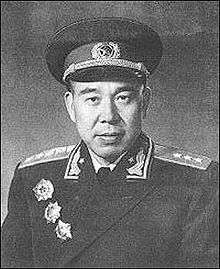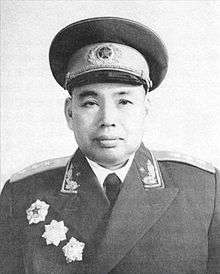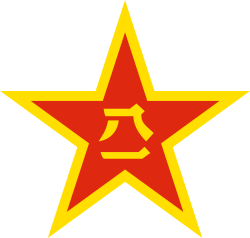Guangzhou Military Region
The Guangzhou Military Region was from 1955 to 2016 one of the People's Liberation Army PLA Military Regions, located in the south of the People's Republic of China. In May 1949, the Central China (Hua Zhong) Military Region (MR) was formed.[1] In March 1955, it was divided into two, the Guangzhou MR and the Wuhan Military Region. When the Wuhan MR was disbanded in August 1985, its troops stationed around the Hubei province were assigned to the Guangzhou MR.
| Guangzhou Military Region | |||||||||||||
|---|---|---|---|---|---|---|---|---|---|---|---|---|---|
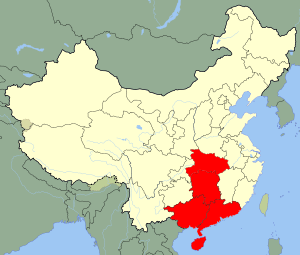 Guangzhou Military Region (highlighted) | |||||||||||||
| Simplified Chinese | 广州军区 | ||||||||||||
| Traditional Chinese | 廣州軍區 | ||||||||||||
| |||||||||||||
The region was disestablished in 2016 and reorganised as the Southern Theater Command.
Just before being disbanded, the Guangzhou MR controlled the Guangdong Province, Guangxi Autonomous Region, Hunan Province, Hubei Province, and the Hainan Province Military Districts. The Hong Kong and Macau garrisons were within the Guangzhou MR area but reported directly to the Central Military Commission.
There were two Group Armies within the Region, the 41st Group Army and 42nd Group Army, and in 2006 the International Institute for Strategic Studies said the region had some 180,000 personnel, one mechanised division, three motorised infantry divisions, one artillery division, two armoured brigades, one artillery brigade, and two anti-aircraft brigades.[2] The 123rd (Amphibious) Infantry Division (53023) at Guigang/Guangxi and 124th Infantry Divisions at Boluo, Guangdong had been identified as Rapid Reaction Units.[3] The Hong Kong garrison includes a brigade with a helicopter unit.
The PLA's 15th Airborne Corps was also located in this MR though not under its command.
List of commanders
- Huang Yongsheng, 1955−68
- Li Tianyou
- Ding Sheng
- Xu Shiyou, 1973−80
- Wu Kehua, 1980−82
- You Taizhong, 1982−87
- Zhang Wannian
- Liu Cunzhi
- Zhu Dunfa
- Li Xilin
- Tao Bojun
- Liu Zhenwu
- Zhang Qinsheng, 2007−09
- Xu Fenlin, 2009−present
Ground Forces

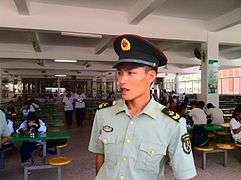
- 41st Group Army (Command Center:Liuzhou) consists of 2 divisions and 3 brigades
- 42nd Group Army (Command Center:Huizhou) consists of 2 divisions and 4 brigades
- 124th Amphibious Mechanized Infantry Division (Boluo)
- 163rd Mechanized Infantry Division(Chaozhou)
- Anti-Aircraft Brigade (Jieyang)
- Special Operation Battalion(Guangzhou)
- Electronic Warfare Regiment(Huadu)
- 6th Regiment of the Army Aviation(Sanshui)
- Engineering Regiment(Huizhou)
- Anti-Chemical Warfare Regiment(Shenzhen)
- Driver and Medic Training Battalion(Dongguan)
- Training Regiment(Huizhou)
Air Force
Commander:Lt. Gen. Han Ruijie Political Officer: Lt. Gen. Wang Jilian Deputy Commander:Maj. Gen. Zhang Shutian
In June 1962, the second Shantou Command Post became the 7th Air Corps. After a move to Xingning in Guangdong Province, it moved to Nanning, Guangxi Autonomous Region, in August 1964.[4]
- 7th Air Corps
- Air Force in Wuhan Base
- 15th Airborne Corps
Nickname
Organizations affiliated with the Guangzhou Military Region often use the nickname "warrior" (Chinese: 战士; pinyin: zhànshì; lit.: 'battle person'), including the Warrior Performance Troupe (Chinese: 战士文工团) and the Warrior Newspaper (Chinese: 战士报).
References
Citations
- Xinhui, Guangzhou Military Region Archived 2008-05-16 at the Wayback Machine, China Defence, accessed November 2008
- International Institute for Strategic Studies, The Military Balance 2006
- "Archived copy". Archived from the original on 2008-10-24. Retrieved 2008-11-09.CS1 maint: archived copy as title (link)
- Appendix G, "Origins of PLAAF MRAFs, Air Corps, Command Posts, Bases, Air Divisions, and Independent Regiments," Ken Allen, Chapter 9, "PLA Air Force Organization", The PLA as Organization, ed. James C. Mulvenon and Andrew N.D. Yang (Santa Monica, CA: RAND, 2002), 445.
Sources
- Chapter 8, PLA Ground Forces, by Dennis J Blasko, in The People's Liberation Army as Organisation, RAND, CF182
